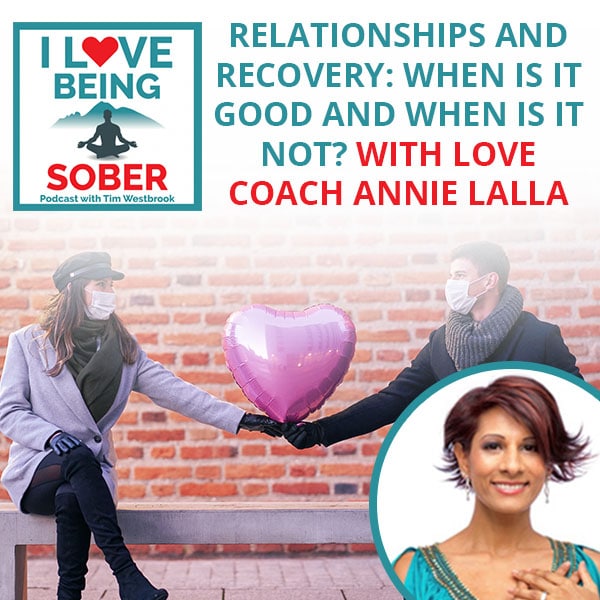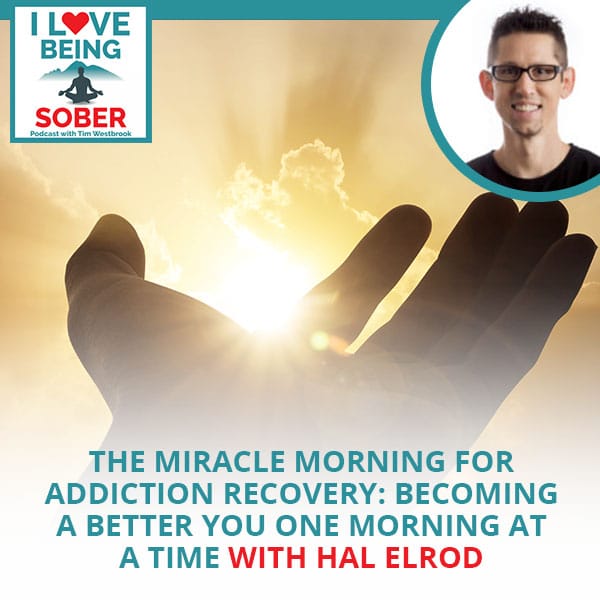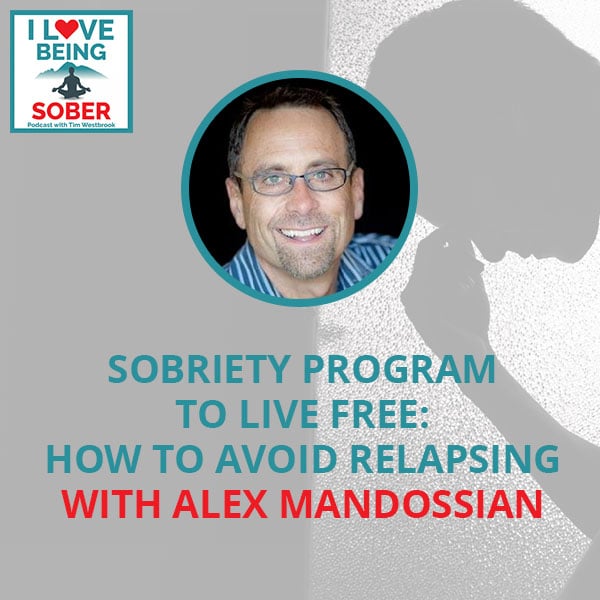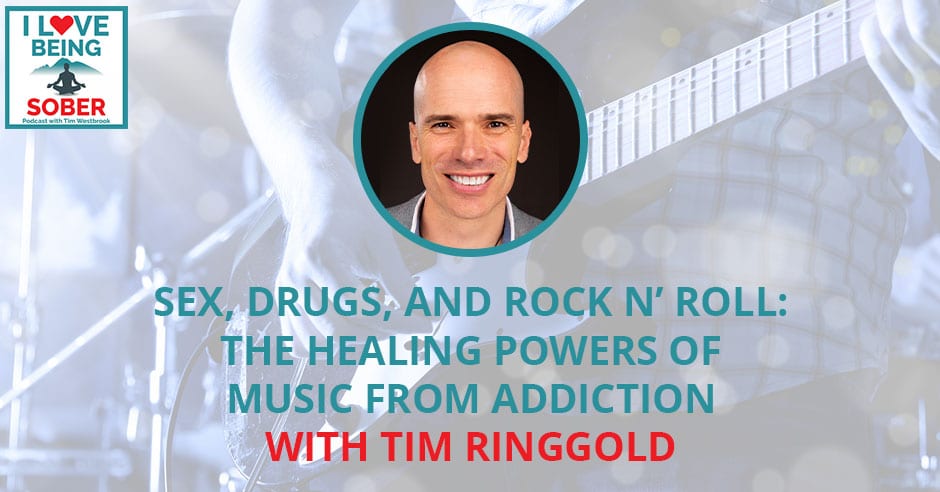
How do you deal with or reduce stress and be sober? Most of the time, everyone looks for something when stressed, and for Tim Ringgold, he found recovery in music. In this episode, Tim Westbrook interviews Tim—a certified music therapist, author, and host of Reduce Your Stress—about his journey of recovery from his addictions to a sober life through music. He discovered how music affects the brain and how to get back into the rhythm by listening and playing music or even making music. Join them today as they discuss Tim’s journey through sex addiction to recovery and the healing powers of music. Sex, drugs, and rock n’ roll are in that order for a reason!
—
Watch the episode here:
Listen to the podcast here:
[fusebox_track_player url=”https://traffic.libsyn.com/secure/ilovebeingsober/ILBS_16_Tim_Ringgold.mp3″ title=”Sex, Drugs, And Rock N’ Roll: The Healing Powers Of Music From Addiction With Tim Ringgold” social_linkedin=”true” social_pinterest=”true” social_email=”true” ]Sex, Drugs, And Rock N’ Roll: The Healing Powers Of Music From Addiction With Tim Ringgold
For many years my team and I have helped thousands of people find their path to long-term recovery. We started the show because there’s so much inaccurate information out there and bad content about the world of recovery and addiction treatment. This is a platform for us to share the truth. There is so much more to getting clean and sober than going to treatment for 30 days then working a twelve-step program. There’s so much more. Those are integral parts of the process. The twelve-step program saved my life and it saved lots of lives out there but there’s a lot more to it, things like food and nutrition, self-care, exercise, fitness, music, developing new healthy lifestyle habits to replace the old lifestyle habits that got us in trouble. These are some of the things that I talked about on this show.
It’s an honor to have my friend Tim Ringgold here. Tim is a board-certified music therapist, columnist, author, and host of the podcast Reduce Your Stress. He’s provided music therapy to thousands of teens and adults to help them lower anxiety and reduce pain. Tim is also an award-winning international speaker having shared the stage with some of the top minds on music, the brain, and personal development, including Tony Robbins. Tim was the first person to give a TEDx Talk on music therapy back in 2012. He is also a former regional president of the American Music Therapy Association. Tim, welcome to the show. It’s good to have you.
Tim, it’s great to be with you. Thanks for having me.
We’ve been working on this for a while. It’s good to have you here. I have your book, Sonic Recovery: Harness The Power Of Music To Stay Sober. Tim, give me a little backstory about you, music, and addiction.
It’s great to be here. It’s always great to hear other people’s stories because you hear yourself in it. I’m happy to share mine a little bit. I’m a kid who grew up on the East Coast who found himself on stage when he was four. I remember, it was like, “This is why I’m here on the planet. It’s music, it always has been.” I was a lucky kid. I had a great upbringing. What didn’t appear like any acute trauma, later on in life, I went back and realize there was a specific relational, spiritual trauma that I would love to touch on because it would be enlightening to the readers. I had a good life until I was 22. On April 18th, 1995 while I was at a live show listening to some music, my five best friends were murdered. I ended up going to five funerals in four days. I’d get up, bury a friend, get as hammered as possible, pass out, and then wake up the next day and do the whole thing over again.
Five of your friends were murdered?
Yep.
How did that happen?
It was an escalating tenant-landlord dispute that went way beyond. For those of you who remember, it was the day of the Oklahoma City bombing when Timothy McVeigh blew up the Federal Building. They were murdered the night before. When I turned on the news, there’s the Federal Building, blown in half on the national channels. On the local channel, it was my best friend’s house burned to the ground and they’re pulling body bags out of the ashes. I thought it was the end of the world. It was the end of my world because my band rehearsed in that house every Wednesday night and this was Tuesday night. If it had been the next day, I would have been one of those five because only three friends lived there and two are in the wrong place at the wrong time.
Kryptonite is the thing that affects us that doesn't affect others. Share on XBurying five friends in four days is not something I recommend for anybody’s journey. I played music at all of their funerals and their memorials. It was my way of saying goodbye. I was the musician in the group. My community embraced me even though it tore me up. The night of the last funeral, I went back and went to some live music. For the first two hours since I had gotten the news, I found peace. No amount of drugs, alcohol, porn, food, or cable TV, and I used them all that whole week, had numb that pain but the music did. It was a pivotal moment in my life. From that moment, I was like, “That’s it. I know what I want to do with my life. I want to be the instrument pun intended that provides peace for others in their toughest times.” That’s what my journey has been like ever since.
That was when you were 22 years old.
Yep.
You were still drinking.
I was drinking, smoking, drugging, sexing, and porning.
You’re doing everything and anything to numb the pain. When did you realize that you had a problem with drugs and alcohol? What was your drug of choice?
It turns out sex was my kryptonite. I was a guy who was in the music business and they say sex, drugs, and rock and roll in that order for a reason. I loved that lifestyle. When I left the music industry, I was able to walk away from drugs and alcohol. It didn’t bother me at all. Women and porn were kryptonite for me. I was powerless around it. That’s why I use the word kryptonite. For those of us who are walking a recovery journey, there are things that affect others that don’t affect us. There are things that affect us that don’t affect others. Kryptonite is my term. I didn’t put two and two together. It took a long time to realize that I had this problem. It was probably not until 2003 that I fully understood that I was powerless over women and that my life had become unmanageable. I walked my ass into a twelve-step meeting on February 17th, 2003. I was scared out of my mind. I’m like, “A freak show.” The meeting was in a circle in a church.
SAA meeting or SLAA?
It was SAA. By the time they got to me, I was like, “I’m Tim. Apparently, I’m a sex addict because you told my story and you talked about thoughts and feelings that I’ve never shared with anybody but I have that exact thing going on inside of me.” It was such an eye-opening experience because what I found in my recovery journey and my clinical journey is that there are a lot of characteristics of thinking in the addictive mind where the person thinks they’re the only one that’s either victimized, suffering, or thinking about whatever it is.
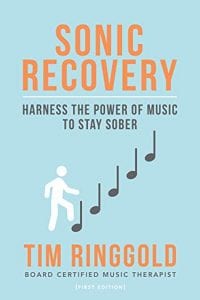
Sonic Recovery: Harness The Power Of Music To Stay Sober
When you go to a meeting, suddenly you realize you’re not the only one but it’s a symptom. It’s like a cough. Your thoughts can be a symptom and you thought you were the only one and you thought you were special. That was wonderfully eye-opening for me because I realized I’m not alone and other people have gotten sober. I don’t have to reinvent the wheel. I don’t have to try anything new. I can follow in other people’s footsteps and take the next right step.
When I called the 800 number for that meeting, a guy named Klaus answered the phone and he said, “I got good news for you. I called the same 800 number ten years ago when my wife served me divorce papers and we’ve been together ever since.” I thought, “If you’ve gotten that darn down the road with divorce papers and then walked it back from that edge, there’s hope.” Klaus gave me hope. The first gift of recovery was hope. The second gift was this feeling of I’m not alone.
When did you realize you were a sex addict? At what point?
I didn’t know I was a sex addict. I didn’t know until I was sitting in the room. I knew I might have a problem.
When did you start thinking you might have a problem?
I didn’t even think I had a problem until I filled out on SAA-Recovery.org. There’s a questionnaire. It’s like, “You might need to go to a meeting if.” It’s ten questions. They’re very specific. I took the questionnaire. I answered yes to eight of them. The criteria were if you answer yes to two of these, you might want to go to a meeting. When I scored 8 out of 10, I was like, “Fuck, there’s something is going on.” I was in a total delusion when I finally went to write out an inventory of all the people I had been unfaithful with my girlfriend with. If you had asked me how many were on the list, I would have told you four and I would have believed it.
My brain had compartmentalized my behavior so well I wasn’t consciously aware of the wreckage until I did an inventory. Do you know those old school lined paper, there are 26 lines? I filled every line and I was mortified, shocked, and surprised because the names kept coming. I had to turn the piece of paper over and I was like, “What?” I went to bed and then I woke up the next day and more names came back to me. My subconscious had buried all that behavior because of all the shame and the cognitive dissonance. I didn’t want to know myself as a player, as someone who was sleeping around, as someone unfaithful. I would have passed a lie detector test that I didn’t have a problem.
How old were you when you went to your first SA meeting?
I’m 31.
The first gift of recovery is hope. The second gift is the feeling that you’re not alone. Share on XNine years after the major incident where five of your friends were murdered.
That story is the origin story of when I realized the power that music has over my suffering, my pain, and my experience of the world. I didn’t connect the two dots along that journey. I was still going along, wrecking ball, out of control, and not thinking I have a problem. When I got into recovery, I went back to school a year later for music therapy. At the time, I wanted to go work in hospice. As I was in my music therapy career in school, I remember doing my first rotation in an inpatient mental health facility. I was working with guys who are struggling with a number of different things, one of them being addiction.
When I went to do my internship, I worked in a 28-day residential program and I saw myself sitting in all my groups and I was like, “Wait a minute.” I’m in this position where this one leg of me, a brother in recovery, is here. This other leg of me is this clinician who knows something about music that others don’t. I can help people in recovery lean on music the right way to support them in their recovery and prevent them from relapsing due to their own music. I was happy because my two worlds came together.
That’s awesome. When you were at the treatment center, where was that in your journey?
I was about five years into my recovery journey at that point.
When you got into recovery for your sex addiction, were you drinking? Were you doing drugs at the time as well?
Weed was my drug of choice if you want to use a substance that isn’t alcohol. I was a recreational stoner and drinker. I wasn’t drinking regularly or smoking regularly. I also wasn’t abstinent. It wasn’t on my radar. I might have a beer or two when I go out on the weekends but I might not. I might go months without smoking and then I might see some friends, stoner buddies, and we might get stoned once every six months or a year. It wasn’t part of the constellation of what was hitting for me.
What is your sobriety date?
In sex addiction, sobriety is a little bit different around using the three circles. My circles have changed throughout the years. There are things that at one point where in my middle circle went to my inner circle and now they’re back.

Healing Powers Of Music: Not everybody is as coordinated as the others, but everybody has rhythm. If you can tap, snap, clap, hum, rap, sing, strum, or scratch, you can be musical.
Give us a quick breakdown of the three circles.
In sex addiction and SAA, we define behavior in three different circles, your inner circle, middle circle, and your outer circle. Your inner circle behaviors would be behaviors that lead to what we call the pitiful demoralization, the bottom-line behaviors, the ones for you that wreck you that leave you feeling more disconnected afterward, that heaped the shame on. They’re behaviors, they’re subjective. Working with your sponsor, you’re the only person who determines what’s in your inner circle. You work with your sponsor to either, over time, add things to that and take things out. It’s a process.
Your middle circle is behaviors. You could look at them in two ways. One, they might be a slippery slope towards your inner circle. Two, they might be a safety net where they’re the least worst option. If you’re feeling squirrely and out of control and you engage in a middle circle, it’s not great. It’s better than your inner circle. That’s like a yellow light if you will, that’s your middle circle. Your outer circle is all the behaviors that lead to you feeling more connected and what we might use the term healthy behaviors, recovery behaviors. The idea is that you could put everything you do from the moment you wake up to the moment you go to sleep in one of those three circles. “My sponsor,” his definition of sobriety is that it’s a process of working with another person to determine what’s good and bad for you. It’s a little bit of a different way of looking at sobriety. It’s dynamic.
It’s not, “I had a beer or I didn’t have a beer. I did a lot of coke or I didn’t do a lot of coke. I smoked some crack or I didn’t smoke some crack.” That’s black and white. You either did or you didn’t. You have these red, yellow, green behaviors, that’s what they also call them. The red behaviors are your bottom-line behaviors, those are the things that lead to guilt, shame, demoralization, and you feeling horrible about yourself. You’ve got the yellow behaviors, which are somewhere in between. You’ve got the green behaviors, which lead to a healthy lifestyle. Those are healthy lifestyle habits. Those are for you playing the guitar. Those are for you running, exercising, eating healthy, having good healthy conversations with people, and with women that don’t lead to objectifying them, whatever would lead to you not feeling good about yourself.
In my journey, sleeping with other women, middle-inner circle behavior. It has always been an inner circle behavior since my first day of recovery. I’ve been abstinent from sleeping with women since the first day of my recovery. I’m grateful for that. Pornography, a whole different candle wax for me. For some people in recovery, it’s a middle circle behavior. For some people, it’s an inner circle behavior. For a long time, it was in my inner circle and I struggled with getting any time more than two years. I could get a year. I could get two years and then I’d have a slip. I’d look at it and then the clock might start over if you will but the frequency went from daily to monthly. It went from monthly to semi-annually. It went from semi-annually to annually. It went to bi-annually and then it might slip back to maybe quarterly.
There’s an important thing when it comes to behavior, which is frequency, intensity, and duration. If you’re changing any behavior, there’s on-off with drinking or with smoking where it’s like, “I never did it again.” Someone who’s working on a recovery journey, the challenge of the sobriety date idea forever thing is I find a lot of people get sober incrementally. What I mean by that is they put down until they don’t and that’s a short period of time. As they practice their recovery, those periods of time get longer and longer and they’re progressing. In certain circles, they feel a lot of shame around the story because it’s a chronic relapse. They’re putting together longer and longer periods of sobriety each and every time. They’re getting better at the game. It’s almost like they’re taking ten steps before they fall over as a kid and then they’re taking twenty steps before they trip. Now they’re taking 100 steps.
For me, my journey has been this incremental way out here. I would love to come on here and be honest and go, “I haven’t looked at porn in twenty years.” I wouldn’t be honest. I couldn’t tell you that. That was the one that’s been the hardest for me to quit. It’s been probably months since I viewed any. I’m feeling rather safe. I still have a sponsor I work with. We talk on the phone probably five days a week, that’s the strongest part of my twelve-step journey. At first, I kept looking at it through this shame lens and then I looked back and I was like, “Your relationship with it is different than it was when you were out of control.” Let’s try to stop beating ourselves up so much. Let’s be a little gentle and yet not take our hands off the wheel and be like, “I’m fine. I got no problems at all,” but to ride that fader between the two.
One of the problems with AA is that if someone slips, if they relapse, it’s like, “I started over. I’ve got less than 30 days.” It’s like, “You have less than 30 days.” However, your recovery journey doesn’t start over. You’re not starting from the ground. You had a slip. You’ve already done some things. You’re already on the journey to recovery. It’s part of the journey for some people. It’s not for everybody. For most people, relapse is part of the journey.
Any behavior change in your life is going to probably require more than one go. My first sponsor walked into his first meeting and never struggled again. His nickname was Gandalf the Wizard because he was this aged guy, white beard, and he never fucked up afterward. I was like, “I can’t be like you. I must be broken because this program works for you. It doesn’t work for me. I can’t put it together any time.” I used to think that the whole thing about less than 30 days, it’s less than 30 days continuous in this run. As if you’re the same person as a newbie who walked in. Let’s all agree it’s an imperfect program and most of us who have been in it are grateful and know that we’d either be dead or in jail without it. We hold both in our hands.
Sobriety is a process of working with another person to determine what's good and bad for you. Share on XYou were still smoking weed and drinking. Are you still smoking weed and drinking a little bit? Are you completely abstinent from drugs and alcohol as well?
I gave up drinking in January 2019. I noticed that every time I had gotten close to sleeping with someone, alcohol was involved. For me, it was like the kerosene that was lighting the fire. I’m also a speaker. Prior to COVID, I’d be on the road 2, 3, 4 times a month speaking at conferences or retreats. I would get into trouble on the road. I would drink on the road, two beers, and then suddenly I’m flirting. I was waiting on someone else’s integrity to keep me safe. Sometimes, I’d meet people who didn’t have that problem. I got close to the edge several times and I realized alcohol was involved every time.
First, I quit drinking on the road. My wife wanted to quit. I saw the ads for One Year No Beer on Facebook. It was December and I remembered I cringed. I was like, “What’s that about? Why did I pull back when I considered One Year No Beer?” Instantly, I was like, “I better sign up.” I signed up with my wife, not on Facebook but in my head. I’m like, “I’m going to do a year with no alcohol.” 2020 came around and I was like, “I don’t feel like going back to alcohol.” I’m glad I didn’t because there would have been lots of opportunities to drink in 2020.
Tim, once I made the decision that I don’t drink, I don’t have to make any decisions anymore. I don’t have to decide whether or not I’m going to drink today or whether or not I’m going to drink tonight or whether I’m going to drink tomorrow or whether or not I’m going to drink because of blank. There are no more decisions involved. It’s off the table. That has been freeing. People ask me, they’re like, “Do you miss it?” I was like, “About 5% of the time.” That’s about it.
Alcohol leads to other behaviors. When I hear you say you’re clean from your bottom line behaviors, instead of resorting to your bottom line behaviors, you resort to something else. You resort to alcohol, drugs, smoking weed, video games, work. If you resort to alcohol because you still drink, next thing you know, your judgment is not great. Alcohol leads to the behaviors. You hear people that say, “I’m a heroin addict. I’m a crack cocaine addict. I’m a meth addict. I don’t have a problem with alcohol. I can still drink.” I’ve seen this happen many times. They have a few drinks and they might be able to do it a few times. The next thing you know, they’re back to meth, heroin, cocaine.
They don’t even know how they got there.
You decided that this was going to be in your life, music, therapy, and you were going to help people. Tell me what transpired next.
The reason I was a musician and wanting to inspire people was because of my friends’ journey. I wanted to give people that peace. In the music business, that culture is unhealthy. I found myself being easily socially influenced than environmentally influenced by all kinds of bad behavior in that world. I discovered there was this career called music therapy. It’s like being a physical therapist working in the same places that a physical therapist works except using music instead of exercise to treat people.
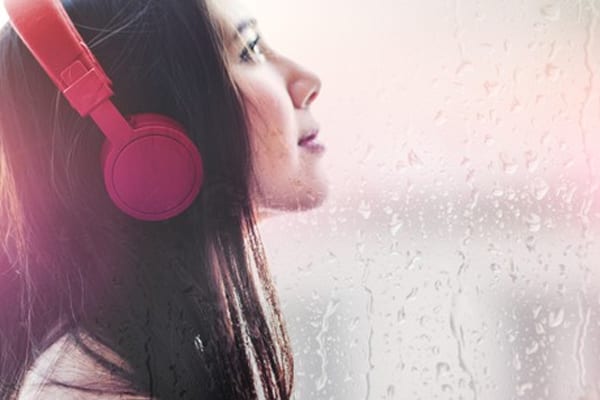
Healing Powers Of Music: Music is the most complex stimulus in nature for the human brain to process. It requires every sub-region of the brain to activate, to take in, take apart music, and put it back together.
I am one part athlete, one part musician. At one point, I wanted to become a physical therapist but it only felt it was skin deep, it was tissue, it didn’t touch the soul and it didn’t touch the mind. I got bored with it. When I discovered that there was a career called music therapy, it was like putting the two in a blender. At the moment I discovered the field, I filled out my college application to go back to school and my financial aid in that same computer Google search. I never looked back. I realized I can help others through the toughest times of their life and I can do it during the day from home, in a clinic, in a school, in a hospital, or in a professional setting.
That social-environmental cue and influence will be healthy for me compared to being in clubs, in venues, on the road, at festivals, where I might be wanting to use music to help others but that social and environmental cue was sex, drugs. A much safer way for me to express this desire to help people is as a music therapist than as a musician. Plus, I don’t have to be on the road. I don’t have to miss my kids’ childhood and that was important to me.
I went back to school, five years, full-time, in my 30s, and became board certified as a music therapist in 2008. My joke is I haven’t worked since because my experience is that I get paid to play and pray. You don’t work music. You play music. People are like, “You’re lucky.” I’m like, “I have a student loan and five years of my 30s that I don’t get back.” Aside from that, I knew that for the next 30 to 40 years, I would be doing what I love in a safe environment, helping people and not missing my kids’ childhood.
What instruments do you play?
My main instrument is my voice, that’s what I’m trained in since childhood. My second instrument and my accompanying instrument is the guitar. Additionally, I play the Native American flute. I play tons of percussion. I can pick my way around a keyboard. I know the theory.
You’re going to be playing music for the rest of your life.
It’s how I express myself. For me, going into the quick spiritual, I’m this one tiny fraction of the whole that came into form to experience itself. What do I want to be doing while I’m in form? I want to express myself athletically and artistically. When I say artistically, it’s musically specifically. The ultimate joy for me in life is when I experience myself playing. That’s the verb playing because I play sports and I play music. I’m here to play. How do I do that in a way that shines light everywhere around me and increases and improves those around me, those little fractions of me? How can I hook me up, the other me? Which one do I want to do? I want to do that through this medium of music. This is thrilling because I experience the same joy you do differently when you’re the listener and I’m the creator like I experience the joy of music when I’m the listener and you’re the creator. It’s a win-win.
What are some of the myths that we have around making music in our culture?
The main ones are that it requires talent. There’s this thing, the music gene, and there’s no such thing. There’s no music gene. Genes are far more complex than the gene. It doesn’t work that way. We like to try to make simple answers out of complex things. Every human body runs in rhythm. It’s the organizing principle of your body. Everything we do, we do in rhythm. Our cells, organs and body runs on rhythm, which is the foundation of music. Everybody has the ability to be musical. We don’t think that way in our culture. We think some people have it and most don’t.
There is a rhythm to the breathing in and breathing out of the entire universe. Share on XI’ve never thought about it like that. You’re right, everybody has rhythm.
Not everybody is as coordinated as the others, but everybody has rhythm. If you can tap, snap, clap, hum, rap, sing, strum, or scratch, you can be musical. Tim, everybody scratch is an itch in perfect rhythm. What we do is we take an egg shaker and we pretend we’re scratching. We’re perfectly rhythmic people. Some of us have been handy around the house. If I can hammer and nail, I play a frame drum. If I can bounce a ball, I can play a hand drum. It’s much simpler than we make it out to in our culture. The big myth is that most of us don’t have it and some of us do. We all got it.
How did music originate?
That’s a whole course. There are two lenses to think through, one is evolutionary. Music is what’s called a proto-language. It’s a pre-language. We sang before we spoke as a species to communicate. In addition to evolutionarily, developmentally.
We sang before we spoke.
Yes. We had sound before we had language. We would use sound to communicate and connect. We developed language later on. There’s a mirror of this, which is developmentally with kids. Kids sing before they speak. They vocalize and they sing before they have language. In all cultures, all moms sing to their babies. All moms sing in the same stepwise motion across the globe, regardless of language, because the kids don’t have language yet. They’re not paying attention to the words. They’re paying attention to the melody and the sound of mom’s voice and the tempo, meaning the speed of it. Developmentally and evolutionarily, music comes before language. It’s our stepping stone.
I’m thinking about a dog barking. Dogs barking in rhythm too. Birds chirp in rhythm. Crickets chirp in rhythm. Everything is in rhythm. Nothing is out of whack. It’s always in perfect rhythm, the same sequence, the same frequency, the same sound.
It is the fundamental organizing principle of the universe. There is a rhythm to the breathing in and breathing out of the entire universe.
How was music discovered? Where was this discovered that music was the first thing that was developed before talking and communicating through language?
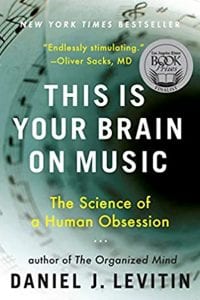
This Is Your Brain on Music
My honest answer is that when I’m spouting out these brainiac little quotes about evolutionary, they are from a guy named Dr. Ani Patel who’s a neuroscientist who studies music in the brain, and this guy named Dr. David Wolfe from the Ohio State University who is also a researcher on music in the brain. I got to attend a real high-level conference and I was a speaker with these guys at this one particular conference. They started to talk about the origin of music and where it started in our journey as a species. Both of those men, their lectures were the ones who taught me that piece of it.
There’s a great book called This Is Your Brain on Music by Dr. Daniel Levitin. He’s also a neuroscientist. He was a recording engineer with the Alan Parsons Project. He went back to school to become a neuroscientist. In his book, This Is Your Brain on Music, he gives you a great journey through music without losing you along the way. It’s a great read and I highly recommend it to anybody. You’ll come away with such a deeper appreciation for the power of music in your life.
What happens in the brain? How does music interact with the brain? How is it relevant to addiction treatment?
What’s the point? Music is the most complex stimulus in nature for the human brain to process. It requires every sub-region of the brain to activate, to take in, take apart music, and put it back together. When we do that and we have the experience that we’re either making the music ourselves or we’re listening to music we enjoy, our reward system gets activated. The reward system is what gets hijacked during drug addiction. That same reward system gets activated when we either make music or we listen to the music we enjoy. It is pleasure-inducing.
That’s relevant to people in recovery who are going through this journey of anhedonia where they’re not feeling anything in early recovery or early treatment because their reward system is been shot to hell and their brain is recalibrating. They don’t feel anything. Introducing pleasure causing behaviors back into their life is important so that they don’t feel they’re dead inside or that there’s no fun left. Whenever we make music or listen to the music we enjoy, dopamine is released in the brain and that’s that feel-good chemical.
When we make music together or we listen to music together, oxytocin gets produced which is the social glue, the hug drug if you will, in our brain. That feeling that we’re connected to someone else is released when we’re making music in a group or we’re listening to it. If we listen to relaxing music, our brain releases prolactin. Prolactin is a chemical that allows us to feel the afterglow, this chill, “That’s nice.” That feeling that we have when we’re satisfied is prolactin and slow tempo music will trigger the release of that.
Everybody knows music is good for their mood and their spirit. When I learned what music did specifically to the brain and the body, I got curious. The last piece that’s important for a person in recovery is that it turns off the stress response. Our nervous system runs in these three speeds or three gears. Rest and digest, which is your normal default nervous system. You’re in connection mode and creativity mode. We have the fight-flight response. People are familiar with that. That’s the sympathetic nervous system activation. That’s when we go into protection mode and reaction mode. That’s when we don’t consider the behaviors we’re doing at the moment. We may not be fully aware of what that’s going to do in the future. We’re right at the moment dealing with whatever’s going on.
Music resets that nervous system faster than any oral medication. Most people have experienced this for themselves when they were in an emotional state and a song came on. I hear this story all the time. I was here. The song came on. Before the song was even over, I was in a different state. It shifted me. It pulled me out. When I listen to recovery specific songs on YouTube, in the comments, I will read over and over, “This song saved my life. This song is the thing that got me into recovery. This song is the one that helped me through my toughest time.” As a musician, I’ve heard that personally as well.
We know that music turns off that stress response. When we have the stress response, that’s when the brain triggers cravings because it’s the brains’ way of trying to self soothe. What we want is we want tools that work fast to turn that stress response over before our brain can issue a whopper-sized craving. The brain is not designed to withstand cravings. It’s designed to do the behavior. That’s the system’s design, it’s trying to self soothe. We can use music in those moments to reset.
Music resets that nervous system faster than any oral medication. Share on XThe brain is designed to do the behavior and not to resist, which is why willpower doesn’t work.
That’s why people feel terrible about themselves because they don’t understand that craving isn’t designed to be withstood. It’s designed to be listened to and followed. Gabor Mat at Wanderlust in 2016, I will never forget the moment he said, “A craving is your brain’s way of trying to love itself.” It’s trying to self soothe.
It was looking for the solution, the behavior that’s going to soothe.
Whatever is going to soothe. That part of the brain doesn’t care if it’s healthy, legal, socially acceptable. It doesn’t care if it caused a bunch of problems. The last 27 times he did, it doesn’t care about the future ramifications. It’s the number one answer. It knows, at the moment, that will scratch the itch.
Gabor Mat also says, “Addiction is a solution to the pain.” The question is not why the addiction. The question is why the pain. That’s why in addiction treatment, we have to look at the root of the trauma because the pain is the cause of the addiction and the bad behaviors. Is there a type of music that’s better to turn off the stress response than another type of music? There are lots of kinds of music. Is any music therapy? Can I turn on Eazy-E? Is my stress response going to be turned off?
Here’s what the research shows, it depends on whether or not you like Eazy-E and it depends whether or not you already have any neuro associations to using while listening to Eazy-E.
What happens is we have party playlists. We all got hammered to music. There’s a neuro association between the music we’re listening to, the emotions we’re feeling, and the behaviors we were doing. I remember early in my recovery, at the time, if I put on EDM dance music, within four beats I was thinking about women. It was coursing through my veins. I was like, “I can’t even come near this.” I could listen to any other music but that music triggered me because that was always the soundtrack.
The good news is that neuro association tapers, prunes, and atrophies over time. In long-term recovery, you can go back and you can check-in and listen to music from that time and you’ll observe the music. You might even have a memory but you won’t have that emotional charge to it. It’s similar to the grief journey. Early in grief, there is an emotional charge with the memory. Over time, you’re left with the memory and the emotional charge fades. Music operates very similarly. It’s important for people in recovery to understand to avoid your party playlists for as long as until you check in with them. Notice that they don’t start to trigger that emotional charge.
The second thing people ask is, “What’s the right type to listen to?” The right type of music to listen to is the music that you enjoy, that you associate with safety, connection, inspiration, and comfort. If you love Celine Dion, all the power to you. Go at it. Listen to Celine. If somebody likes Michael Bolton, good for you. That’s why God invented headphones so that I don’t have to hear Michael Bolton. It’s like a flavor. It’s subjective. You don’t have to try anything new. You don’t have to buy anything new. Stick with the genres you already are comfortable with that already have that inspirational neuro association. Beware of the party playlist.
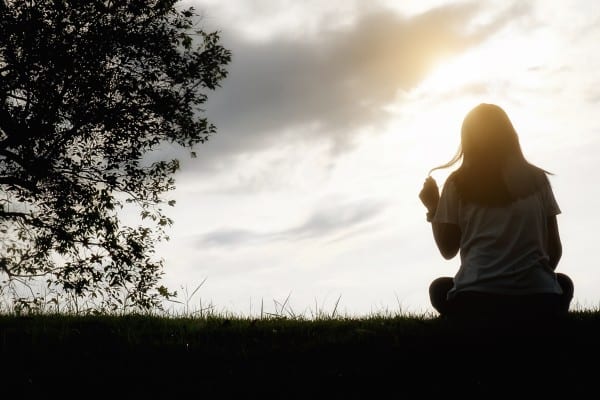
Healing Powers Of Music: People feel terrible about themselves because they don’t understand that craving isn’t designed to be withstood. It’s designed to be listened to and followed.
There is dark music. You have Death Metal. You have Punk rock. What would your response be to that? Let’s say I love death metal. If I love Death Metal and I’m trying to get clean and sober, it’s not triggering, is that going to lift me up?
It depends on your relationship with Death Metal. It may very much so. What we noticed in the research is that music doesn’t cause emotion. Emotion causes the choice of music. It’s like the chicken or the egg. A lot of parents are concerned about the music their kids listen to that it’s going to cause them to be depressed or suicidal. They reach for that music because they’re already vibrating at that point and the music resonates with something inside of them. That’s why when you’re sad, you listen to sad music because it’s matching the experience you’re already having.
Here’s what they noticed, particularly with adolescence and this can be extended to adults. 1 of 3 things happens when you’re in that negative mood and you turn on what some people would call dark music. One, the music acts as this resonant catharsis where you feel heard and understood and you express and get out that emotion and you feel better afterwards. Two, it doesn’t do anything. You’re listening to the music but your mood preceded the music and your mood is still there after the music. Sometimes, the music will exacerbate those feelings. You’ll get in a spiral. It could be an anger spiral, particularly with metal, with fast tempo music. It could be a downward spiral. What they find is that sometimes, even the same music, kids will use it to experience all three depending on where they are in the moment.
It’s interesting that it’s not like, “Stay up. This is okay. This isn’t okay.” It’s subjective. What’s important is to have a connection with someone else to be able to talk about those experiences without any judgment. The problem parents have is they can’t talk with their kids about their music without judgment. They suck at it. They have total amnesia. They forget that when they were a teen their music drove their parent’s crazy. That’s why kids will spend more time in their bedroom listening to music and feel more connected alone in their room than down in the living room because the music doesn’t judge them, it doesn’t lecture them and it doesn’t scold them.
What about the lyrics? I’m a person that doesn’t listen to the lyrics. I’m more into the beat. I’m more into the way that it makes me feel. I might know all the words to a song. However, I have no clue what is being said. I can remember, I would get in trouble because I would listen to things and my mom is like, “Do you know what that is saying?” It’s like, “Not really. I’m not into it. I like the beat.” What do you have to say about the lyrics?
The jury is out on lyrics. When I pull kids to ask them why they listen to the music they listen to, l what you said, I get, “I don’t know. I like the beat. It’s bumping.” I’ve also had guys in groups say, “I used because Lil Wayne sang about it.” I have to be honest. There are three types of influence, personal influence, my own thoughts and beliefs, social influence, which is the influence of others on me, and then environmental influence, the influence of the environment on me. Social influence is real. We have to say that. What’s important is having a connection so we feel connected. We can check-in if you’re listening to something that’s got crazy lyrics. You start thinking, “That’ll be a good idea.” It’s more complex than I wish it was.
Music is therapy and music turns off the stress response. Listening to music versus playing music, which is going to do a better job?
The gold standard is making music. Making music doesn’t mean learning an instrument. It means involving your body in music. You could be listening to the music you enjoy and then try to stay with the beat whatever the beat is. Try to drum the beat. Try to sing along with the beat or hum it or rap along. If you engage your body with the music, it pulls you into the present moment because music is time-based. You have to be present to make music. It allows you to stay present whereas music listening, you can go all over the place. Music making is the gold standard and you don’t have to learn an instrument to make music.
Dancing is number two and listening is number three.
Making music doesn't mean learning an instrument. It means involving your body in music. Share on XAny way you engage your body, that’s aces.
Tim, how can people reach you?
I have a gift for anybody who’s reading. One of the gifts I give away to everybody is the gift of relaxation. We all need tools to help us reset our stress. If you go to SonicRecovery.com, I’ll give you a fifteen-minute relaxation vacation and that’s the place that’ll put you on my list. I’m also at TimRinggold.com. My podcast is Reduce Your Stress with Tim Ringgold, find that where you find podcasts. I release relaxation music and interviews on that every week. Upcoming is the Stress Elimination Summit Recovery Edition where we have 28 speakers talking specifically about how to reduce your stress in the context of a recovery journey and why that’s important. You can go to StressEliminationSummit.com to register for free.
Is there anything else you want to share?
Stick with it. Find the good and focus on it.
Tim, thank you so much.
Thanks, Tim.
Important Links:
- Reduce Your Stress
- TEDx Talk – When Meds Fail: A Case for Music Therapy
- Sonic Recovery: Harness The Power Of Music To Stay Sober
- SAA-Recovery.org
- One Year No Beer – Facebook
- This Is Your Brain on Music
- TimRinggold.com
- StressEliminationSummit.com
- https://fb.watch/30e9VCV1WF/
About Tim Ringgold
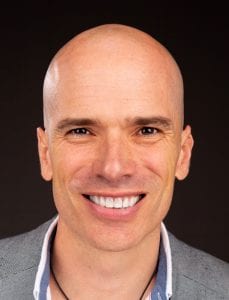 Tim Ringgold is a board-certified music therapist, columnist, author, and host of the podcast, Reduce Your Stress. He has provided music therapy to thousands of teens and adults to help them lower anxiety and reduce pain.
Tim Ringgold is a board-certified music therapist, columnist, author, and host of the podcast, Reduce Your Stress. He has provided music therapy to thousands of teens and adults to help them lower anxiety and reduce pain.
Tim is also an award-winning international speaker, having shared the stage with some of the top minds on music, the brain, and personal development, including Tony Robbins.
Tim was the first person to give a TEDx talk on music therapy in 2012. Tim is also a former Regional President of the American Music Therapy Association.
